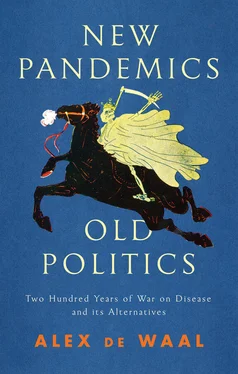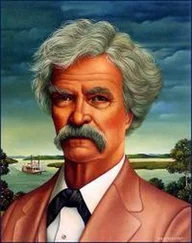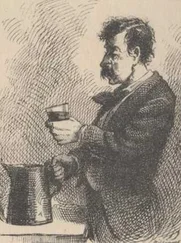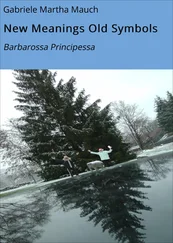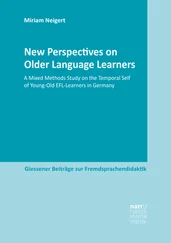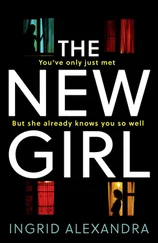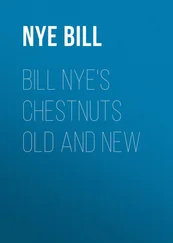Alex de Waal - New Pandemics, Old Politics
Здесь есть возможность читать онлайн «Alex de Waal - New Pandemics, Old Politics» — ознакомительный отрывок электронной книги совершенно бесплатно, а после прочтения отрывка купить полную версию. В некоторых случаях можно слушать аудио, скачать через торрент в формате fb2 и присутствует краткое содержание. Жанр: unrecognised, на английском языке. Описание произведения, (предисловие) а так же отзывы посетителей доступны на портале библиотеки ЛибКат.
- Название:New Pandemics, Old Politics
- Автор:
- Жанр:
- Год:неизвестен
- ISBN:нет данных
- Рейтинг книги:4 / 5. Голосов: 1
-
Избранное:Добавить в избранное
- Отзывы:
-
Ваша оценка:
- 80
- 1
- 2
- 3
- 4
- 5
New Pandemics, Old Politics: краткое содержание, описание и аннотация
Предлагаем к чтению аннотацию, описание, краткое содержание или предисловие (зависит от того, что написал сам автор книги «New Pandemics, Old Politics»). Если вы не нашли необходимую информацию о книге — напишите в комментариях, мы постараемся отыскать её.
New Pandemics, Old Politics — читать онлайн ознакомительный отрывок
Ниже представлен текст книги, разбитый по страницам. Система сохранения места последней прочитанной страницы, позволяет с удобством читать онлайн бесплатно книгу «New Pandemics, Old Politics», без необходимости каждый раз заново искать на чём Вы остановились. Поставьте закладку, и сможете в любой момент перейти на страницу, на которой закончили чтение.
Интервал:
Закладка:
The ‘war on disease’ is also a script for conquest. The European version was born exactly at the zenith of colonial ambition and still carries that imperial DNA, as a project for dominion over the territories of the globe, its peoples and its microbes. Its language is male, white, and controlling. It promises mastery over nature, setting our bounds wider still and wider, making our mighty technologies mightier yet. This is perhaps its most insidious implication: a victory over a disease is a validation of a benevolent (for us) Anthropocene.
Fighting words also serve politicians whose agenda is dominating the day’s headlines. In the last few years, legal-rational forms of public authority have yielded to charismatic, transactional, and disruptive styles of governing. For such politicians, the narrative is the solution, and science should be strictly in its service. Donald Trump was an exemplar. Transactional politicians such as he are tactical fighters, not strategic war planners. They relish political combat but don’t want the institutional discipline of organizing a war effort, and choose their fighting talk accordingly. Like others who deny or disregard scientific method and data, Trump did so against a background of unquestioned faith in other things – in his case, winning through acts of will and rhetoric. And while he considered face masks and restrictions on travelling and congregating as something between an annoyance and a conspiracy, he believed fervently in the catechism of the magic bullet, perhaps even more so than his scientifically literate political peers.
The main topic of this book is the construction and reconstruction of the Euro-American ‘war on disease’ narrative. I chose three historical pandemics for this purpose. Cholera is the case in chapter 2. This is where Europe’s war on disease began two hundred years ago, as a handful of metaphors, images, and practices. Of these the most consequential was the concept of policing the contagious, inherited from the plague and applied to cholera. At that time, the idea of a ‘war’ that resembled a real war would have been fanciful. That changed, and by the end of the 19th century a firm storyline took shape. Its first element was the plan of campaign – an assemblage of instruments for social control, which we could distil into a slogan: lookout, cleanup, and lockdown. ‘Lookout’ was alertness for cases, especially sick travellers, and detecting the pathways of disease spread. ‘Cleanup’ was sanitation: personal cleanliness, fresh air, clean drinking water, draining stagnant water in which insects might breed, controlling vermin and disposing of sewage and rubbish. ‘Lockdown’ was quarantine, sequestration, isolation, and curfew – policing people and pathogens. The next operation in the war story was conquest and dominion: the project of exploring, naming, classifying, and controlling the entire surface of the planet and every living thing upon it, from microbes to human beings to forests. In short: imperial exploration, expansion, and subjugation. The final element was the technology for victory, when microbiologists began crafting ‘magic bullets’ that could hit those invisible enemies.
Chapter 3deals with influenza in 1918–19: a pandemic that refuted civilization’s proudest achievements. It was a monstrous killer and, insofar as there was a fight against it, influenza won. The Great War created and transmitted the virus, public health measures worked only at the margin, and medical science found neither cure nor vaccine. But the script served its purposes: governments continued to mobilize armies and send them to the warfront and citizens kept faith in biomedicine. The failure and deceit over influenza were too big to contemplate, and the pandemic remained untold history for two generations. Virulent influenza was our social taboo, but our virological totem: fear of its return energized pandemic preparedness in the 21st century.
The war on disease was refashioned after World War II, when international health campaigns against smallpox and polio registered huge gains. The successes were such that the medical academy was ready to declare victory over infectious diseases altogether. This was hubris. In chapter 4, I turn to a momentous setback with a surprising twist: HIV/AIDS. The story of the global response to this pandemic is inspiring – and also confounds the standard narrative. A coalition of people living with HIV/AIDS and a wider community of carers, physicians, and global health advocates pursued an agenda of health and human rights, which surpassed expectations on both counts. They sometimes used fighting language, but in the different sense of a struggle for liberation and emancipation. AIDS was exceptional, however. For other ‘emerging and re-emerging’ infectious diseases, the ‘war on disease’ was reinvented. This is the focus of chapter 5. After the millennium, fears of unknown or resurgent pathogens that threatened ‘Pandemic X’ re-militarized pandemic preparedness. Advocates for global health security found a storyline in common with the war on terror. Our fears and efforts were targeted on individual germs, and not on the ecologies that generate them or the society and economy that enable them to spread.
The history of the ‘war on disease’ narrative is an ironic commentary on medicine and warmaking. Microbes have decided the outcome of wars, though generals on the winning side don’t often acknowledge it. Military doctors have been leaders in the technologies of controlling contagious diseases, and their medical victories have enabled armies to complete conventional forms of conquest, such as expanding empires. Military scientists have also created monstrous bioweapons in the laboratory. Pandemic preparedness intersects with biosecurity risks when a laboratory engineers a virulent pathogen to discover more about the pandemic threats we may face, with the aim of better understanding and counteracting them. A pathogen like this may escape through a laboratory accident (which has happened a number of times, though scientists prefer not to talk about it, as described in chapter 5), and once an academic journal has published the genetic codes for a virulent virus, it’s possible for a malevolent scientist to repeat the feat.
Covid-19 was the least unexpected pandemic in history. Scientific and institutional preparations narrowed the uncertainties of a new pathogen to a span that should have been readily manageable. And indeed the development of vaccines in record time is testament to scientific expertise backed by public money. The best-laid plans were confounded, however. It turned out that the main agent of radical uncertainty was not a new and inscrutable microbe. Instead it was Anglo-American political leaders whose doctrine of disrupting institutions, including science, made the pandemic ungovernable. At a cost of hundreds of thousands of dead and millions impoverished, this has had the modest virtue of showing that the ‘war on disease’ is a humdrum script that cannot guide political action.
Towards Democratic, Ecological Public Health
I would have liked to have drafted a new playbook for emancipatory public health in the Anthropocene, but this book concludes with something more modest: an appeal that it’s necessary to talk about this. There are hopeful openings, such as ‘One Health’, which unifies public health with animal health and environmental sustainability, and ‘people’s science’ approaches to disease control. At the moment, however, these remain minority agendas.
For now, people who work for democracy, human rights, liberal education, environmental sustainability, and similar goals – citizens, activists, elected officials, and the like – are bewildered as a pandemic arrives. They shouldn’t be. For English-speakers at least, their problem begins because the English language doesn’t give them a firm mental grip on the crisis. Our vocabulary is deficient.
Читать дальшеИнтервал:
Закладка:
Похожие книги на «New Pandemics, Old Politics»
Представляем Вашему вниманию похожие книги на «New Pandemics, Old Politics» списком для выбора. Мы отобрали схожую по названию и смыслу литературу в надежде предоставить читателям больше вариантов отыскать новые, интересные, ещё непрочитанные произведения.
Обсуждение, отзывы о книге «New Pandemics, Old Politics» и просто собственные мнения читателей. Оставьте ваши комментарии, напишите, что Вы думаете о произведении, его смысле или главных героях. Укажите что конкретно понравилось, а что нет, и почему Вы так считаете.
